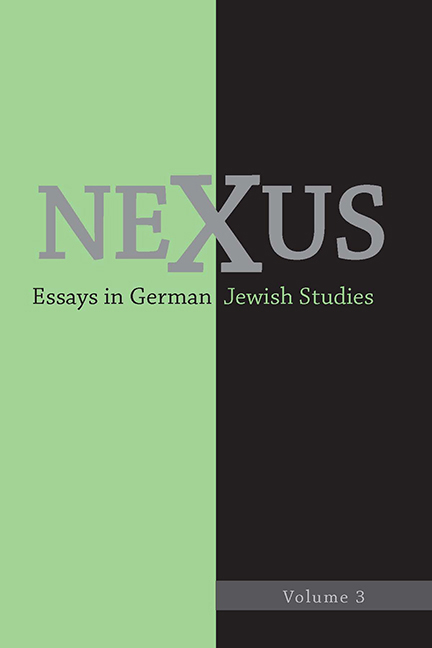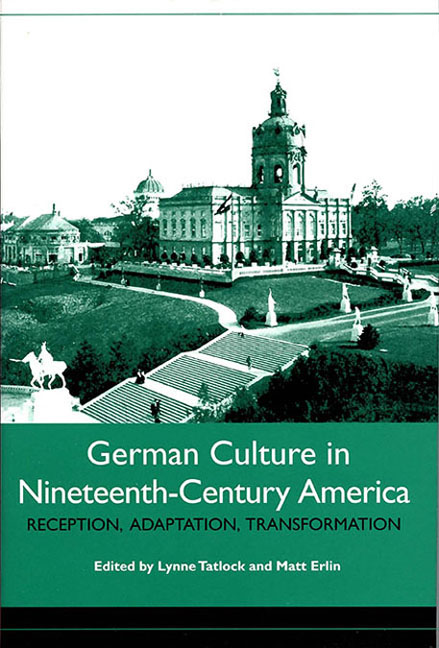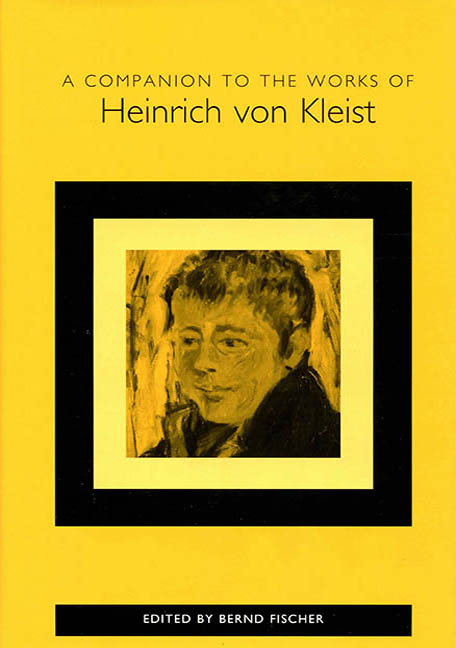25 results
Acknowledgements
-
- Book:
- Nexus 3
- Published by:
- Boydell & Brewer
- Published online:
- 11 May 2017
- Print publication:
- 15 March 2017, pp ix-x
-
- Chapter
- Export citation

Nexus 3
- Essays in German Jewish Studies
-
- Published by:
- Boydell & Brewer
- Published online:
- 11 May 2017
- Print publication:
- 15 March 2017
Dedication
-
- Book:
- Nexus 3
- Published by:
- Boydell & Brewer
- Published online:
- 11 May 2017
- Print publication:
- 15 March 2017, pp v-vi
-
- Chapter
- Export citation
Contents
-
- Book:
- Nexus 3
- Published by:
- Boydell & Brewer
- Published online:
- 11 May 2017
- Print publication:
- 15 March 2017, pp vii-viii
-
- Chapter
- Export citation
Frontmatter
-
- Book:
- Nexus 3
- Published by:
- Boydell & Brewer
- Published online:
- 11 May 2017
- Print publication:
- 15 March 2017, pp i-iv
-
- Chapter
- Export citation
4 - Immigration and Naturalization Acts
-
- Book:
- German Culture in Nineteenth-Century America
- Published by:
- Boydell & Brewer
- Published online:
- 13 April 2017
- Print publication:
- 12 November 2005, pp 247-248
-
- Chapter
- Export citation
Contributors
-
- Book:
- German Culture in Nineteenth-Century America
- Published by:
- Boydell & Brewer
- Published online:
- 13 April 2017
- Print publication:
- 12 November 2005, pp 317-320
-
- Chapter
- Export citation
Contents
-
- Book:
- German Culture in Nineteenth-Century America
- Published by:
- Boydell & Brewer
- Published online:
- 13 April 2017
- Print publication:
- 12 November 2005, pp v-vi
-
- Chapter
- Export citation
2 - In Pursuit of Intellectual Culture
-
- Book:
- German Culture in Nineteenth-Century America
- Published by:
- Boydell & Brewer
- Published online:
- 13 April 2017
- Print publication:
- 12 November 2005, pp 87-88
-
- Chapter
- Export citation
3 - Translation American Style
-
- Book:
- German Culture in Nineteenth-Century America
- Published by:
- Boydell & Brewer
- Published online:
- 13 April 2017
- Print publication:
- 12 November 2005, pp 151-152
-
- Chapter
- Export citation

German Culture in Nineteenth-Century America
- Reception, Adaptation, Transformation
-
- Published by:
- Boydell & Brewer
- Published online:
- 13 April 2017
- Print publication:
- 12 November 2005
Acknowledgments
-
- Book:
- German Culture in Nineteenth-Century America
- Published by:
- Boydell & Brewer
- Published online:
- 13 April 2017
- Print publication:
- 12 November 2005, pp ix-x
-
- Chapter
- Export citation
List of Illustrations
-
- Book:
- German Culture in Nineteenth-Century America
- Published by:
- Boydell & Brewer
- Published online:
- 13 April 2017
- Print publication:
- 12 November 2005, pp vii-viii
-
- Chapter
- Export citation
Index
-
- Book:
- German Culture in Nineteenth-Century America
- Published by:
- Boydell & Brewer
- Published online:
- 13 April 2017
- Print publication:
- 12 November 2005, pp 321-336
-
- Chapter
- Export citation
Frontmatter
-
- Book:
- German Culture in Nineteenth-Century America
- Published by:
- Boydell & Brewer
- Published online:
- 13 April 2017
- Print publication:
- 12 November 2005, pp i-iv
-
- Chapter
- Export citation
1 - Cultural Politics at the Turn of the Twentieth Century
-
- Book:
- German Culture in Nineteenth-Century America
- Published by:
- Boydell & Brewer
- Published online:
- 13 April 2017
- Print publication:
- 12 November 2005, pp 1-2
-
- Chapter
- Export citation
Index
-
- Book:
- A Companion to the Works of Heinrich von Kleist
- Published by:
- Boydell & Brewer
- Published online:
- 27 April 2017
- Print publication:
- 03 May 2003, pp 251-258
-
- Chapter
- Export citation
Intellectual Paradigms
-
- Book:
- A Companion to the Works of Heinrich von Kleist
- Published by:
- Boydell & Brewer
- Published online:
- 27 April 2017
- Print publication:
- 03 May 2003, pp 139-140
-
- Chapter
- Export citation
Critical Approaches
-
- Book:
- A Companion to the Works of Heinrich von Kleist
- Published by:
- Boydell & Brewer
- Published online:
- 27 April 2017
- Print publication:
- 03 May 2003, pp 19-20
-
- Chapter
- Export citation

A Companion to the Works of Heinrich von Kleist
-
- Published by:
- Boydell & Brewer
- Published online:
- 27 April 2017
- Print publication:
- 03 May 2003



